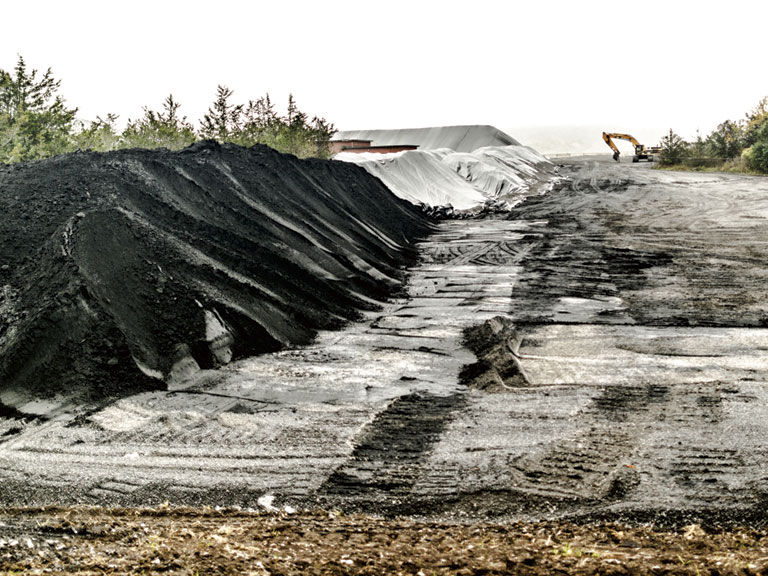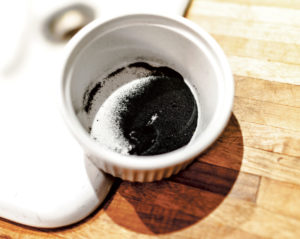County News
Dust up

Soot coats neighbours of Picton Terminals as frustration with expanding development deepens
When Anne Taylor and Jack Vanderholst arrived at their summer home on White Chapel Road for a Thanksgiving dinner with the family, they found their pool and every horizontal surface of their home covered in a fine, black soot.
The black powder was petroleum coke, a form of petroleum oil that has been processed into solid powder form, like powdered coal. It wasn’t difficult to find the source—Taylor and Vanderholst’s property borders the Picton Terminals, where mountains of the stuff are kept for shipping.
This week, a cleaning company hired by the Picton Terminals visited the residence to clean up the mess, or at least what was left after several heavy rainfalls.
This is not the first time the couple has had trouble with the terminals. Each time they visited their property over the past few months, they have been arriving to an increasingly tall mountain of limestone rock, aggregate removed from the cliffside to make way for a road to the water side docks.
“Since they started blasting that road down to the water, they’re stockpiling lots of rocks near our property,” says Vanderholst. “And because they’re stockpiling all the rock there, they’ve cut down 50- year-old trees, a nice buffer that was there before between them and us, and now I have to look at a giant rock pile.”

Residue found in a cup left ourdoors at Anne Taylor’s White Chapel Road home recently.
Vanderholst says the mountain has come too close to the edge of his property, failing the 30- metre setback required by County bylaws. In the process of the work, he was disappointed to see they had cut down two mature trees that edged his property.
He sent a registered letter to the County outlining his concerns several months ago, but has recieved no reply. Prince Edward County council has been supportive of the initiative at Picton Terminals.
Vanderholst’s neighbours have collectively complained, in part because of the company’s salt storage practices, which have led to contamination.
Mike Hymus is another resident of White Chapel Road. His property also neighbours the terminal, with a pond that runs into Picton Bay. Last year, he boiled down 500 millilitres of pond water to test it, and was left with about two ounces of salt.
Others, including Vanderholst, worry the Picton Terminals will attempt to turn the Picton Bay into a spot akin to the Hamilton harbour, notorious for its grey, ugly industrial mess.
Ben Doornekamp, whose family business purchased the port in 2014, says although the petroleum coke contamination was the company’s fault, they never broke the rules. He says the company followed the guidelines for storing the substance, but it was insufficient, and is changing its practices to ensure the issue doesn’t reoccur.
“We completely screwed up,” says Doornekamp. “We had a product handling plan, the product handling plan didn’t work. One neighbour got some petcoke on their property. We’ve changed the handling plans… It was a minor issue where we screwed up and we’re fixing it so it doesn’t happen again.”
Doornekamp says on the other hand, he’s mystified by the issues with salt.
“From 1991 to 2014, what’s been happening with the salt hasn’t changed. Why it’s become an issue since we bought the property, I don’t know, but we’ve been very proactive,” says Doornekamp. “We’ve been working of our own accord with the Ministry of the Environment to develop a stormwater management plan where no water goes into the bay. We’ve also recommended, of our own accord… a water sampling program of the bay.”
Vanderholst says he’s observed more salt at the port.
“It has become more of an issue because they are storing so much more than then. Before they took it over, there was a couple of hills of salt there, and it would always be gone by springtime,” he argues. “The amount of salt they store there now is crazy, it’s probably three or four times more.”
The port was originally purpose-built to ship iron ore for the Marmoraton Mining company, and began operations in the mid-1950s. When that company closed its doors in the late 1970s, the port continued to operate, although by 1991, the only product the port took in was road salt, used by the County over the winter.
The nearby Essroc cement factory also has a dock, dedicated to bringing in materials for the processing plant.
In 2006, during amalgamation, the port lost its zoning status as a port, and was rezoned as extractive industrial, the zoning for a quarry. Although that rezoning would have meant no materials could be shipped or sold from that location, the salt shipping continued, even after the Doornekamps purchased the property.
In two years, the company has invested more than $10 million in the port, updating it for more intensive usage, shipping materials like salt, petroleum coke and bauxite. They have also applied for a grant from Infrastructure Canada that would allow them to continue to invest in the site.
“We’ve put in a request to our federal government, with the support of the local mayors… to help up finish our site upgrades and purchase a bit more equipment, specifically two cranes,” says Doornekamp.
They are also applying for a zoning change, which means a public meeting will be scheduled shortly, followed by a planning meeting of council.
Doornekamp says the port is an important advancement in industrial infrastructure for southeastern Ontario. He says each ship will take hundreds of thousands of kilometres of truck traffic off of main arteries like the 401, allow material to travel a shorter distance, and even allow the County’s corn and soy farmers to sell their crops at a significant discount from trucking costs.
“This part of the world is severely deficient in ports,” says Doornekamp. “Everything has to be shipped into other ports and shipped into our region and other regions. We’re trying to add another port to the Great Lakes, to reduce our province’s, our country’s environmental footprint.”
Residents around the Picton Bay don’t buy it. Neighbour Victor Lind questions whether saving the 401 a portion of truck traffic is worth adding stress on County Road 49—already considered a decaying roadway. He is also mystified by the complacency of council, which has supported the terminal’s expansion despite neighbours’ concerns.
“[Doornekamp is] clearly in contravention of the bylaw,” said Lind. “He thinks that a new rezoning application is going to make this go away.”
Lind says people are shocked to learn that the County “picks and chooses” which of its bylaws to enforce and which ones to ignore.

I find this situation very concerning for a number of reasons. Our elected officials are allowing Picton Terminals to continue operating when they know the facility is not zoned properly and, they are choosing not to enforce the bylaws which would protect neighbouring properties. This “screw-up” as Mr. Doorenkamp calls it, and the fact they are operating outside the zoning regulations shows us Picton Terminals acts without regard for the law. The facility should be closed until the zoning issue is dealt with.
if that port was bringing in more tourists there would not be any whining would there